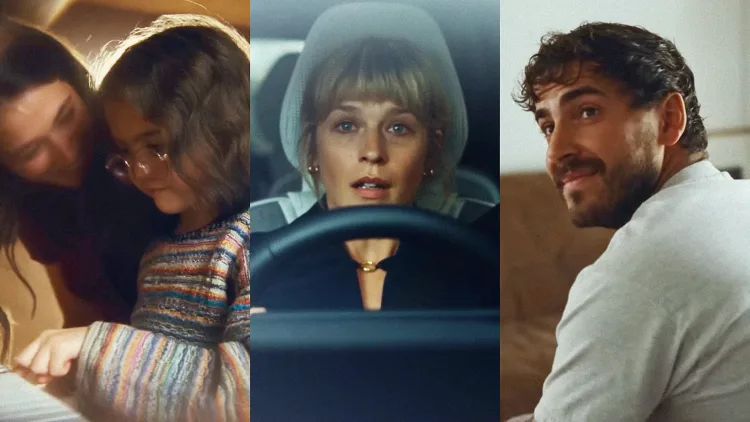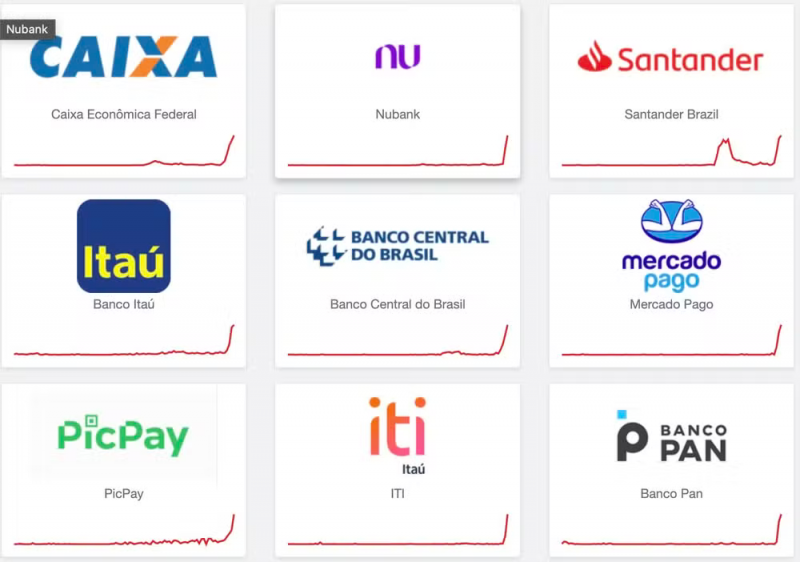[Images: Volvo]
A young woman approaches her distracted partner. He asks her if something’s wrong. She hesitates. Then reveals the positive pregnancy test. They quietly embrace, incredibly happy at the news.
As she heads out to run an errand, the phone rings and it’s the guy’s mom; he hesitantly tells her the news, then launches into a lifetime of his hopes and dreams and fears and ambitions for fatherhood. As we hear his conversation, we see his partner walking around their urban neighborhood, going into a diner to pick up a take-out order, then making her way home. At the climax of the commercial, we see her crossing the street as a Volvo SUV speeds toward her. The screen cuts to black, then the line, “Sometimes the moments that never happen . . . matter the most” appears, followed by the stunned/grateful face of the Volvo driver after having stepped on the brakes. Next, we see the guy quietly walking into his partner’s hospital room. It ends as the two embrace on her hospital bed with the reveal that they’re actually cuddling their newborn.
This commercial for the new Volvo EX90 has entered the culture wars. In light of Jaguar’s viral rebranding, which some on the right have deemed too woke, Volvo’s commercial is being held up as an example of auto marketing that’s “pro-family” (and “pro-life”).
A young woman approaches her distracted partner. He asks her if something’s wrong. She hesitates. Then reveals the positive pregnancy test. They quietly embrace, incredibly happy at the news.
As she heads out to run an errand, the phone rings and it’s the guy’s mom; he hesitantly tells her the news, then launches into a lifetime of his hopes and dreams and fears and ambitions for fatherhood. As we hear his conversation, we see his partner walking around their urban neighborhood, going into a diner to pick up a take-out order, then making her way home. At the climax of the commercial, we see her crossing the street as a Volvo SUV speeds toward her. The screen cuts to black, then the line, “Sometimes the moments that never happen . . . matter the most” appears, followed by the stunned/grateful face of the Volvo driver after having stepped on the brakes. Next, we see the guy quietly walking into his partner’s hospital room. It ends as the two embrace on her hospital bed with the reveal that they’re actually cuddling their newborn.
This commercial for the new Volvo EX90 has entered the culture wars. In light of Jaguar’s viral rebranding, which some on the right have deemed too woke, Volvo’s commercial is being held up as an example of auto marketing that’s “pro-family” (and “pro-life”).
The Newsweek headline reads, “Jaguar’s ‘woke’ rebranding vs. Volvo’s family focus.” Fox Business says, “Pro-family Volvo ad celebrated on social media.” And across social platforms of X and TikTok, the Volvo spot is being categorized as a family-friendly outlier amid all the woke brand action.
It could be a convenient culture war argument, if it wasn’t so completely inaccurate.
Positive depictions of family life have been a bread-and-butter staple of advertising since the beginning. In fact, brands have long been criticized for portraying a warped, overly idealized version of families. But in recent years, brands and advertisers have created some truly heartwarming work that depicts the ups and downs of parenthood. The work cuts across product and brand categories, but they all share a common message: Despite the challenges, family life is worth it.
These brands, including Volvo, know exactly what they’re doing. By acknowledging uncertainty, anxiety, joy, and all the emotions in between, brands are attempting to build an emotional connection between your lived experience and their products. And hey, if an ad can give you goosebumps or bring a tear to your eye, then maybe they’ve earned a purchase consideration. Volvo’s ad is effective, but let’s not pretend this playbook is new. And it’s certainly not part of a broader commentary on cultural trends and family dynamics. Some proof: These five classic commercials, dating back more than a decade, that do exactly what Volvo has done with its new spot.
Coca-Cola “Ser Padres” (2013)
Created by agency Santo Buenos Aires, this wonderful spot (set to a cover of the Bee Gees’s “To Love Somebody”) shines a light on some of the uglier realities of child-rearing. But ultimately, these individual moments of chaos don’t override the love and joy. Eleven years after I first covered it, it’s still one of the best.
Hornbach “Tell Me About Your Project” (2014)
I wrote about this one a decade ago, when German DIY retail brand Hornbach and ad agency Heimat Berlin crafted a surprisingly sweet story about a dad and his goth teen daughter that you’d never expect from a hardware store.
P&G “Best Job” (2012)
Launched for the 2012 London Olympic Games, this spot is part of a broader P&G campaign around several Olympic campaigns, starting in 2010. Created with agency Wieden+Kennedy, the work ties athletes’ success to the yearslong efforts and support from their moms. Anchored in this universal truth, the campaign has been among the most popular Olympic ads every time its aired.
Upon its debut in 2010, according to W+K, it was declared the biggest and most successful global campaign in P&G’s 175-year history with $500 million in global incremental sales, 76 billion global media impressions, and more than 74,000,000 global views.
Angel Soft “Just Dad” (2017)
Did you ever think you’d get emotional over a toilet paper ad? Exactly. Made by ad agency Deutsch, the spot shows the journey of a single dad—from trying to find public restroom diaper-changing tables to navigating teenage drama. Deutsch then-executive creative director (now creative chair) Karen Costello told Adweek at the time that toilet paper ads tended to focus strictly on product attributes, but they decided to focus on families as an untapped niche in the marketing message for this product category.
John Lewis “The Beginner” (2022)
Long known for its Christmas ads, U.K. retailer John Lewis tugged at the heartstrings by teaming a kid with a fantastical friend. See 2014’s “Monty the Penguin” or 2017’s “Moz the Monster.” But here, from 2022, we see a middle-aged guy trying to learn how to skateboard. He puts in a valiant effort but, frankly, just get demolished. Yet, the frozen peas on the knees are all worth it when he and his wife welcome their new foster child at the front door and . . . she has a skateboard under her arm.




